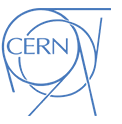CERN
courtesy CERN
General Description
CERN (Centre Européen pour la Recherche Nucléaire) is one of the largest and most prestigious research organisations in the world. By colliding particles at very high energies and traveling near the speed of light, CERN physicists and engineers explore the basic constituents of matter. They use the biggest and most complex scientific instruments ever built on Earth. CERN employs around 2700 staff members but there can be over 13’000 accredited users from over 100 countries.
In 2008, after 10 years of construction, the Large Hadron Collider (LHC) started operating using the 27 km diameter tunnel and infrastructure built for the earlier LEP accelerator (LEP, the Large Electron Positron collider, 1989-2000).
At present, the LHC beam energy is 6,8 TeV. To extend its discovery potential, the LHC will be upgraded to increase its luminosity (rate of collisions) by a factor of 10 beyond the original design. The CERN High Luminosity LHC project (HiLumi HL-LHC project) was approved by the CERN Council in June 2014 and the project completion is scheduled for 2030.
Particles generated from the main LHC injector source can also be directed to other experimental facilities on the CERN site.
Founding year: 1954 Founding members (12): Belgium, Denmark, France, Germany, Greece, Italy, Netherlands, Norway, Sweden, Switzerland, United Kingdom and Yugoslavia. Member states CERN 2022 (23).
Budget CERN 2021: ~1'200 MCHF
Swiss financial contribution: pro rata of the Swiss GNP ~4 %
Swiss research institutions involved: ETHZ, EPFL, PSI, Uni BS, GE, BE and ZH.
Procurement policy
The accounting currency at CERN is the Swiss Franc. CERN purchases goods and services in relation to its own procurement rules. CERN does not follow EU procurement rules.
CERN's Procurement rules define two adjudication principles for contracts: "lowest compliant" (for Supplies) or "best-value-for-money" (for Industry Services).
Contracts are awarded to suppliers by a selective tendering procedure depending on the contract value:
- Under 200 kCHF: CERN sends a Price Inquiry only to pre-selected companies. Companies are encouraged to register in CERN's supplier database if their technology offer complies with CERN technology overall demand. Only Price Inquiries above 50 kCHF are sent to all ILOs. Price Inquiry requests, Demande d'Offre, are issued with prefix DO-xyz.
- Over 200 kCHF: CERN uses a two-step process.
- Companies must first participate in a market survey. If they are already known by CERN (registered in CERN's supplier database or in contact with the relevant procurement officer or technical contacts) they will receive the market survey directly. Market Survey requests are issued with prefix MS-xyz.
- Based on the answers to the market survey, CERN selects the companies that meet the requirements and invites them to tender. Invitation to Tender requests are issued with prefix IT-xyz.
- Over 750 kCHF: Procurements require an initial go ahead from the CERN Finance & Administrative Committee.
Only Market Survey (MS-xyz) are announced on CERN procurement webpage.
Market Survey (MS-xyz) are announced on the Swiss ILO Tender page if they are considered to be relevant to the Swiss high-tech industry. Construction and civil engineering calls, service calls and procurement calls for reseller activites (IT, COTS electronics) are not announced.
Adjudication rules and Geographical Return
CERN applies "re-alignment rules" for the award of contracts exceeding 100kCHF to technically and financially qualified bidders. The re-alignment rules are based around the geo-return for CERN Member States. The geo-return value is smoothed over 4 years.
- Where the lowest compliant bid is from a company offering supplies originating from a poorly balanced Member State, the contract shall be awarded to that company.
- Where the lowest compliant bid is from a company offering supplies originating from a well balanced Member State, CERN shall enter into negotiations with the two lowest bidders offering supplies originating from a poorly balanced Member State provided that their bids fall within 20% of that of the lowest bidder.
- If, as a result of these negotiations, the lowest of the bidders offering supplies originating from a poorly balanced Member State agrees to align its price to that of the lowest bidder, the contract shall be awarded to the company offering supplies originating from the poorly balanced Member State, provided that the bid with the realigned price still complies with all the stipulated requirements.
- The re-alignment rules start to apply when the contribution of a poorly balanced country equals or exceeds 60% in a Supply offer, or exceeds 40% for an Industry Services offer.
- Contracts below 10 kCHF are not included in the geo-return calculation.
The status of poorly balanced and well balanced Member States is published each year on 1 March using procurement data from the previous year. The status for realignment rules currently in force, that is between 01.03.2017 and 28.02.2018, is shown here.
CERN can provide exclusive tenders to Member States that are very poorly balances, without notifying other Member States.
